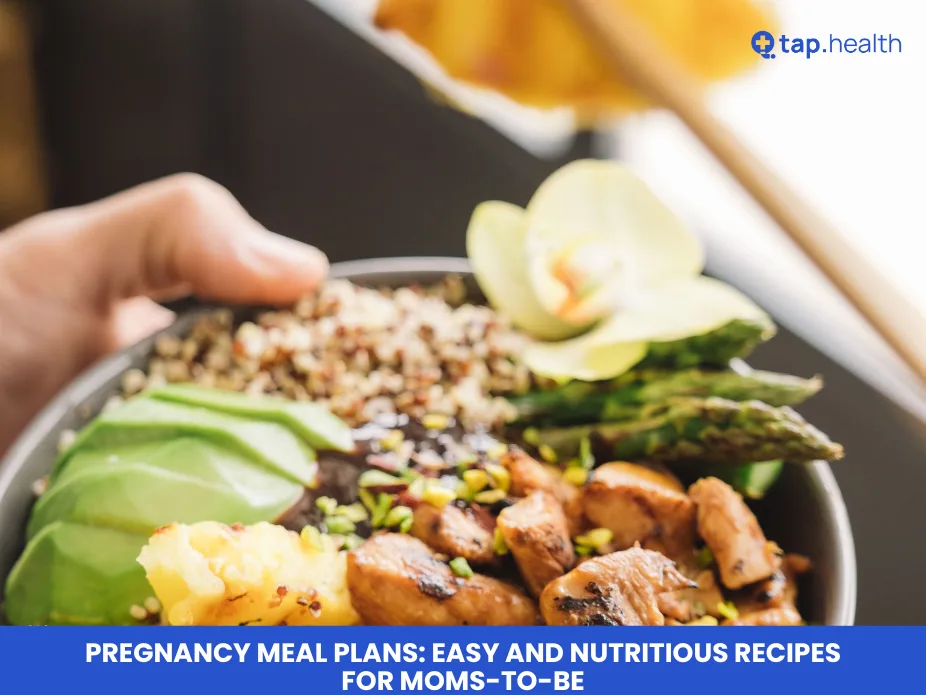Why Pregnancy Meal Plans Matter for You and Your Baby
Pregnancy transforms your body, and a thoughtful pregnancy meal plan ensures both you and your baby get essential nutrients like folic acid, iron, calcium, protein, omega-3 fatty acids, and fiber. A balanced pregnancy diet supports healthy fetal development, reduces risks of complications, prevents anemia, boosts energy, and eases common issues like constipation and nausea.
Key Nutrients Every Pregnant Woman Needs
- Folic Acid → Prevents neural tube defects
- Iron → Supports extra blood volume and fights anemia
- Calcium → Builds strong bones and teeth
- Protein → Fuels baby’s growth and tissue repair
- Omega-3s (DHA/EPA) → Boosts brain and eye development
- Fiber → Keeps digestion smooth and prevents constipation
First Trimester Meal Plan: Beat Morning Sickness with Small, Frequent Meals
Morning sickness can make eating tough. Focus on bland, nutrient-dense foods in smaller portions.
Sample Day:
- Breakfast: Oatmeal topped with chia seeds, peanut butter & berries
- Snack: Greek yogurt + handful of almonds
- Lunch: Grilled chicken, quinoa & roasted veggies
- Snack: Whole-grain toast with avocado
- Dinner: Baked salmon, sweet potato & steamed spinach
Second & Third Trimester Meal Plan: Fuel Rapid Baby Growth
Appetite returns and calorie needs rise by about 300 extra per day. Prioritize protein, healthy fats, and complex carbs.
Sample Day:
- Breakfast: Scrambled eggs with spinach + whole-grain toast
- Snack: Carrot sticks & hummus
- Lunch: Lentil soup with side salad & olive oil dressing
- Snack: Banana or apple with nut butter
- Dinner: Turkey & bean chili over brown rice
Quick & Healthy Pregnancy Recipes You’ll Actually Make
- Spinach & Feta Omelette (Iron + Protein + Calcium) Whisk 2 eggs, sauté 1 cup spinach, add ¼ cup feta, fold & serve.
- Sweet Potato Black Bean Bowl (Fiber + Fiber + Plant Protein) Roast cubed sweet potato with cumin & olive oil. Mix with black beans and avocado.
- Grilled Chicken Quinoa Avocado Salad Top mixed greens & cooked quinoa with grilled chicken slices, avocado, cucumber, olive oil & balsamic.
Expert Tips for the Best Pregnancy Diet During Pregnancy
Registered dietitian Dr. Lisa Y. Kim says: “Don’t eat for two — eat twice as smart.” Choose colorful fruits, vegetables, whole grains, lean proteins, and healthy fats daily. Limit processed foods, added sugars, and empty calories.
Simple Steps to Build Your Own Weekly Pregnancy Meal Plan
- Include protein in every meal
- Add at least 2–3 servings of vegetables
- Choose whole grains over refined
- Include a healthy fat source (avocado, nuts, olive oil, salmon)
- Eat 2–3 fruit servings daily
- Stay hydrated — aim for 10+ cups of water
Keep easy snacks ready: hard-boiled eggs, nuts, fruit, yogurt, veggie sticks with hummus.
Pregnancy Nutrition FAQs
Q: How many extra calories do I really need?
A: About 340 extra in the second trimester and 450 in the third — focus on quality, not just quantity.
Q: Are prenatal vitamins enough?
A: No. They supplement, not replace, a healthy pregnancy diet.
Q: What foods should I avoid?
A: Raw/undercooked meat, fish high in mercury (shark, swordfish), unpasteurized dairy, alcohol, and limit caffeine.
Q: Can I still drink coffee while pregnant?
A: Yes, up to 200 mg caffeine daily (about one 12-oz cup) is considered safe by most experts.
Can TapHealth Help Manage Gestational Diabetes Through Better Meal Planning?
Yes! TapHealth’s smart nutrition tools and real-time glucose insights help pregnant women with gestational diabetes create safe, balanced pregnancy meal plans that keep blood sugar stable while delivering all essential nutrients for mom and baby. Personalized guidance makes healthy eating simple and stress-free.
Eating well during pregnancy doesn’t have to be complicated. With these easy pregnancy meal plans, nutrient-rich recipes, and practical tips, you can feel energized, reduce discomfort, and give your baby the healthiest start possible. Listen to your body, stay consistent, and enjoy this special journey!
References:
- American Pregnancy Association. (2023). Nutrition During Pregnancy. Retrieved from https://americanpregnancy.org
- Mayo Clinic. (2023). Pregnancy Diet: What to Eat & Avoid During Pregnancy. Retrieved from https://www.mayoclinic.org



